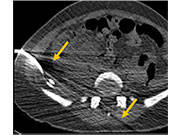Image Wisely, a joint initiative of ACR, RSNA, ASRT and AAPM,
provides information to the medical community to promote safety in medical imaging.
Safety Cases
Image Wisely® is pleased to present our free series of online and mobile-compatible educational modules. Our Safety Cases are interactive slide presentations with case-based questions that allow you to firstly improve, and then assess, your understanding of important safety concepts in medical imaging.
Each case will present its own specific learning objectives, a case overview, interactive case challenges, key takeaways, a summary discussion, and a quiz to assess your understanding of the material. Upon successful completion of the quiz and the case evaluation survey, participants will have earned, and can claim, their CE credit.
The target audiences for Image Wisely Safety Cases are radiologic technologists, medical physicists, and radiologists. The cases may also be useful for referring physicians, radiology administrators, and other healthcare personnel.
Step-by-step instructions on accessing the cases are available here.
The ACR Disclosure Policy: In compliance with ACCME requirements and guidelines, the ACR has developed a policy for disclosure and review of potential conflicts of interest, and a method for resolution if a conflict does exist. The ACR maintains a tradition of scientific integrity and objectivity in its educational activities. In order to preserve these values and ensure its educational activities are independent and free of commercial bias, all individuals, including planners, presenters, moderators and evaluators, participating in an ACR educational activity, or an activity jointly provided by the ACR must disclose all relevant financial relationships with any commercial interest.
The following planners and managers have no financial relationships to disclose:
Dustin A. Gress, MS; Wil Creech, BS; Priscilla F. Butler, MS [ret.]
Previous Cases
Case 13: Portable Chest X-rays through Glass during the COVID-19 Pandemic

CE and CME currently unavailable
While chest radiographs are not recommended to screen for COVID-19, portable chest x-rays are often ordered in the work-up for a complicated pneumonia and may have a role for ED patients or patients needing hospital admission with suspected or known COVID infection.
Case 12: Low Dose Renal CT

CE and CME currently unavailable
Appropriate imaging of patients with renal colic can be accomplished by following published guidance and engaging the radiology care team. This case discusses how to choose and optimize imaging for patients with suspected urolithiasis or nephrolithiasis.
Case 11: Image Wisely During CT-guided Procedures in Pregnant Patients

CE and CME currently unavailable
Appropriate imaging and management of pregnant patients with acute appendicitis is critical to decrease the risks to the mother and fetus. This case discusses how to decrease patient and fetal dose while safely performing a procedure by applying several dose reduction methods.
Case 10 (special edition): Child-sizing CT Dose: Optimizing Patient Care Through Quality Improvement – Pediatric and Adult Imaging

CE and CME currently unavailable
Developed by Image Gently® and designed to provide practical explanations of some of the newer technologies and terminology in CT scans, this case reviews quality improvement as it relates to the performance of CT imaging. It discusses radiation risk and the relationship of image quality to patient dose.
Case 9: Balancing Image Quality and Radiation Dose in Cardiac CT Angiography

CE and CME currently unavailable
Explains how cardiac CTA scan parameters affect radiation dose exposure and image quality and illustrates techniques to modify scan acquisition and image post-processing to improve this balance in cardiac CTA.












